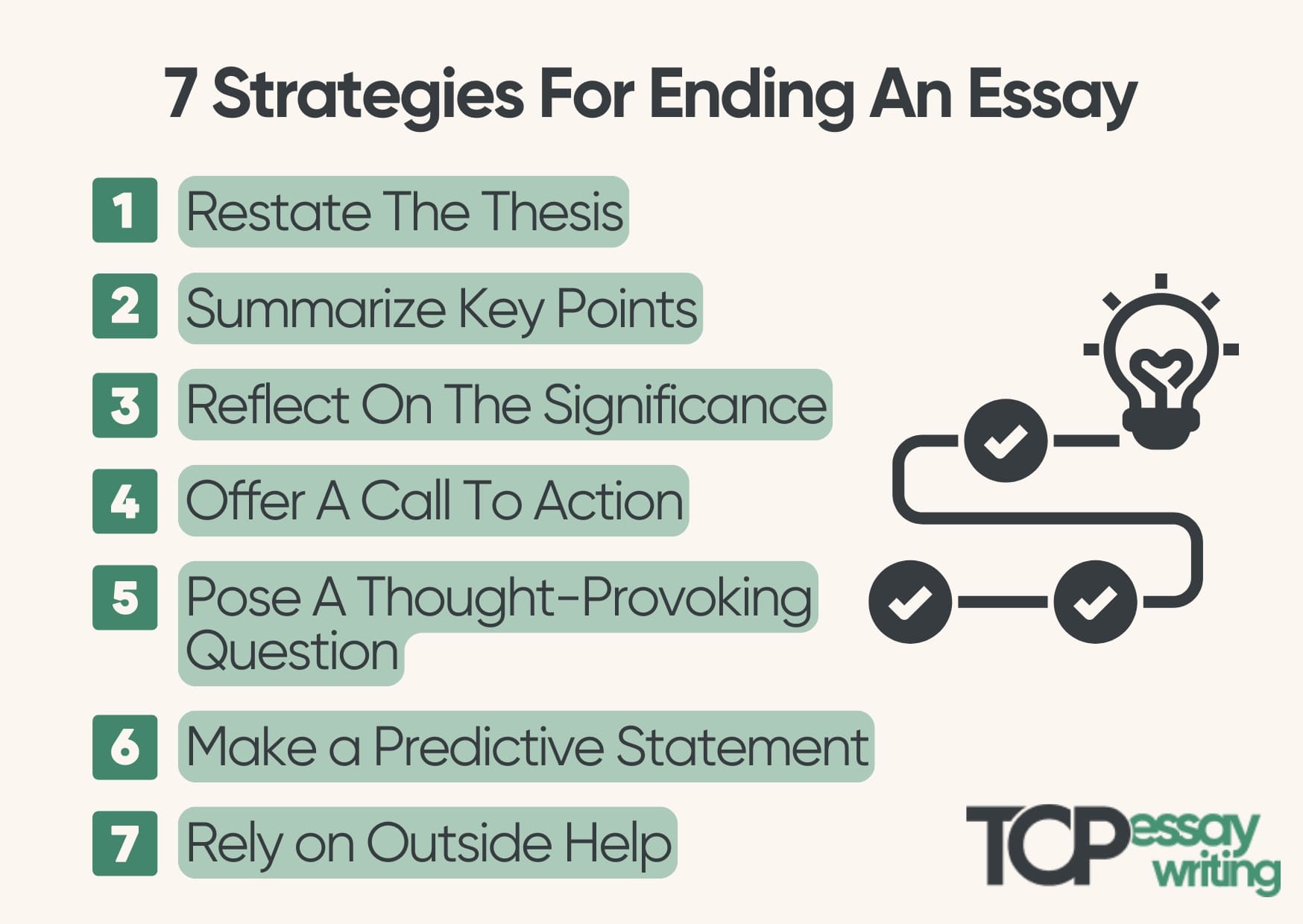Top Special Offer! Check discount
Get 13% off your first order - useTopStart13discount code now!
The Best Way to End an Essay and Make an Impact
Wondering how to write a good conclusion for an essay? It can be challenging for students, especially if you are entirely out of ideas. Moreover, the purpose of the conclusion of your essay is not just to wrap up the paper but to leave a lasting impression that will make the reader think. Therefore, it must be well thought out. TopEssayWriting experts have shared their knowledge on how to write a good conclusion paragraph that will meet all the criteria and remain in the reader's memory:
- Summarize key points of your paper
- Reflect on the significance of your topic
- Provide closure
- Connect to the introduction
- Engage the reader
7 Strategies for Writing a Powerful Conclusion
There are many good ways to end an essay, though they might differ from paper to paper. In an analysis essay, a conclusion should synthesize your insights. In a persuasive essay, the most compelling thing you could do is create an urgent call to action. In a reflective essay, you might present some future considerations. Now, look at the strategies that will help you impress your audience.
1. Restate the Thesis in a Paraphrased Form
The best way to start a conclusion paragraph is by rephrasing your thesis. Present the leading idea of the essay and reinforce its key arguments, all in one sentence. Expand on its points afterward. This strategy is best used in analytical, argumentative, and persuasive essays. Example:
“Despite the debates on global warming, people should take urgent measures to control it and save the planet’s future.”
Expert advice: Go back to your thesis and remind the readers of it in the conclusion. Present it from a slightly different angle by using new words.
2. Summarize Key Points
Another best way to conclude an essay is by reiterating key points and ensuring the reader remembers all the critical arguments. Types of essays that are best suited for this strategy: Informational, analytical, and research essays. Example of ending:
“Sustainability can be measured by looking at the economic, social, and environmental consequences, and the only way to ensure continued progress is by following sustainable practices.”
Expert tip: Combine the main findings and present them in a few sentences so the reader remembers what they've read.
3. Reflect on the Significance
Good ending sentences for essays should draw out the more significant meaning of the essay's topic. It helps put the conclusion in a broader context. For example:
“The history of voting rights helps understand how they came to be, but it also shows why citizens need to continue to exercise their voice.”
Specialist recommendation: Connect your essay's conclusion to the most prominent themes or current concerns to highlight its wider significance.
4. Offer a Call to Action
A good closing sentence must urge the readers to follow the essay's directive and take a concrete step to solve a problem. This strategy is more often used in persuasive and argumentative essays. Example:
“To mitigate plastic pollution, it is vital to advocate the introduction of better policies and responsible consumer habits.”
Professional hint: Encourage the readers to take action to move a project forward. You can use a free conclusion generator to finish your paper quickly.
5. Pose a Thought-Provoking Question
Another best way to end an essay is by posing a question at the end of your paragraph. It gets the gears turning, and every time a reader thinks about your topic for even a split-second, you win. This strategy is recommended for analytical, reflective, and persuasive essays. Example:
“As long as technological progress continues, how can people keep up with innovation while balancing it with ethics?”
Professional advice: Ask questions to make your audience engaged in the problem.
6. Make a Predictive Statement
The best conclusion paragraph should draw conclusions about future developments based on the findings of the essay. This approach is best suited for research, analytical, and speculative essays. Look at the example:
“Based on the present trends, it is likely that the market will witness some major shifts in the nature of jobs within a decade.”
Insider tip: Anticipate future consequences to give your conclusion an edge and establish why your essay is relevant.
7. Rely on Outside Help
If none of the above ways to complete an essay works for you, consider getting an essay for sale from human experts. This strategy is universal and can be applied to any writing problem. Professionals can easily strengthen the topic and coherence of your essay. Choose writers you trust, give them instructions, and let them share their expertise.
What to Avoid in a Conclusion
All the best ways to end an essay have the same goal. They must leave your reader with a certain long-lasting impression. Our experts prepared crucial tips for you. Here are five common mistakes you should avoid if you want to make your essay's ending clearer and capable of producing a memorable impact:
- Avoid direct repetition: Don't restate your thesis and main points word for word. A fresh synthesis is a better goal. Repetition can make your conclusion seem redundant, so summarize it with rephrased insights rather than the same ones.
- Avoid introducing new information: If you look at free essay examples online, you'll see that all the best ways to end a conclusion entail sticking to the facts you've already presented. Resist the temptation to add new arguments or evidence in the conclusion because extra discussion would be out of place.
- Avoid vague generalizations: Conclusions that make general statements without much specificity can feel weak or unfocused. Bring your argument to a clear endpoint that is well-grounded and specific. Be precise. Vague endings leave readers frustrated.
- Avoid abrupt endings: Readers appreciate it when you circle back to key points in your essay or otherwise summarize your arguments, providing an ending that satisfies them. Choose the best way to end a conclusion paragraph by making it flow smoothly and logically. Bring the main idea of your paper to a natural close.
- Avoid emotional appeals: While a strong emotional appeal can be very persuasive, sometimes it can actually backfire and undercut your argument, as it can look manipulative or even dishonest. In the best conclusions for essays, emotion must be balanced with rational analysis for your writing to sound credible and persuasive.
Time to Start Writing Your Own Conclusion
Being flexible and playing with different approaches can improve your writing. What is the best conclusion? Now you have the answer to this question. Recall key points, ask provocative questions, predict the future, and see what works for your writing style and topic. Experiment, and then you will be sure to find the right way to finish your essay clearly and efficiently!




